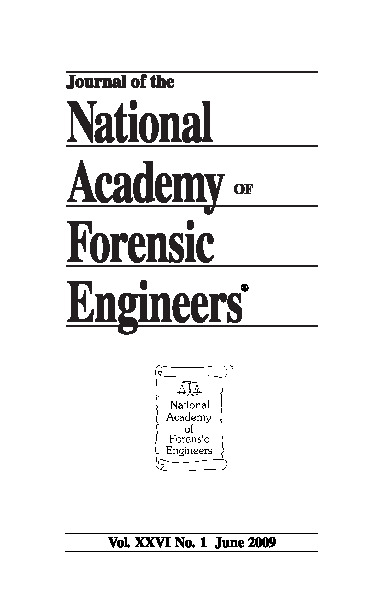Forensic Engineering And The Scientific Method
DOI:
https://doi.org/10.51501/jotnafe.v26i1.711Keywords:
ScienceAbstract
The Scientific Method Is Utilized In Order To Understand The Relationship Among Observations Of Physical Phenomena, While Minimizing The Influence Of Human Bias And Maximizing Objectivity. Specific Procedures For The Application Of The Scientific Method Vary From One Field Of Science To Another, But The Investigative Technique Universally Provides For An Analytical Framework To Acquire, Collect And/Or Integrate Knowledge. Engineering Forensics Involves The Analysis Of The Parameters Or Cause(S) Of Incidents Or Failures And/Or Hypothetical Prevention Methods. Engineering Analysis Of Forensic Problems Is A Multifaceted, Multidisciplinary Pursuit That Is Often Wide In Scope. Forensic Engineering Generally Applies Existing Science In Conjunction With The Knowledge, Education, Experience, Training And Skill Of The Practitioner To Seek Solution(S). The Scientific Method, Including Definition Of A Null Hypothesis, Is Rarely Utilized In Forensics As New Science Is Rarely Required. A Forensic Engineering Investigation Typically Involves The Application Of Long Established Science (Newtons Laws, For Example). Forensic Engineering Encompasses The Systematic Search For Knowledge Necessitating The Observation And Definition Of A Problem; The Collection Of Data Through Observation, Research, Experimentation And/Or Calculation; The Analysis Of Data; And The Development And Evaluation Of Findings And Opinions. The Ultimate Objective Of A Forensic Engineering Investigation Is Uncompromised Data Collection And Systematically Considered, Iteratively Derived And Objectively Balanced Conclusions.Downloads
Published
2009-01-01
How to Cite
Liptai, Laura L. 2009. “Forensic Engineering And The Scientific Method”. Journal of the National Academy of Forensic Engineers 26 (1). https://doi.org/10.51501/jotnafe.v26i1.711.
Issue
Section
Articles
License
Copyright (c) 2009 National Academy of Forensic Engineers

This work is licensed under a Creative Commons Attribution-NoDerivatives 4.0 International License.
All rights © Journal of the National Academy of Forensic Engineers.
Full statement regarding the author's license of copyright to the NAFE is shown on the Copyright section of the Submissions Page.






